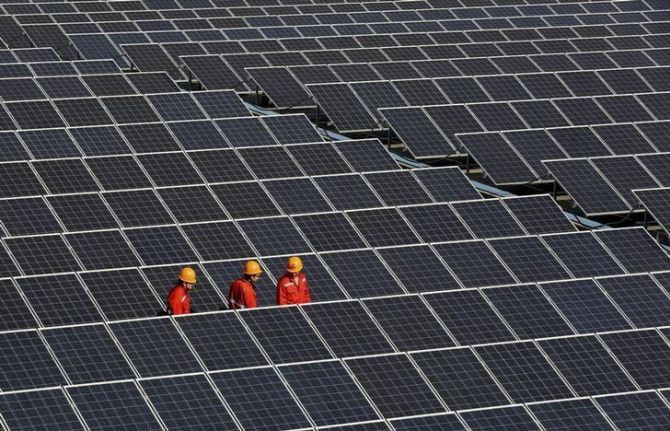Cheap equipment imports, especially from China, is a major reason for falling tariffs in solar tenders

The Directorate General of Anti-Dumping (DGAD) has again started a probe to ascertain if dumping of solar panel imports from China, Malaysia and Taiwan is hurting the domestic industry.
The investigation is in response to an application from the Indian Solar Manufacturers’ Association (ISMA), which has pleaded a retrospective duty be imposed on the importers as dumping of solar cells and modules has considerably damaged the prospects of the indigenous sector.
A similar case was filed in 2012 but the government had not imposed a fine.
The DGAD has prima facie accepted evidence of dumping by these countries.
“A causal link exists between the said dumping and injury exists to justify an initiation of anti-dumping investigation,” said a DGAD notification issued on Friday.
Cheap equipment imports, especially from China, is a major reason for falling tariffs in solar tenders. The domestic industry has also seen a decline in the number of projects reserved for domestic industry, owing to World Trade Organization (WTO) trade rules.
“So after discussions with the government, we decided to ask for protection from cheap imports snatching away our market,” said an executive with a leading solar panel manufacturing company.
The domestic industry has alleged that around 80 per cent of the market has been taken away by the imports, said the application reviewed by Business Standard. “We have submitted that the Chinese imports undercut our prices by 40 per cent.
The injury level would now be computed by the DGAD,” said an ISMA executive.
“We are hoping for a speedy resolution. At the same time, we are expecting for some interim relief, given the high injury level.”
The current installed capacity of Indian solar cell manufacturing is around 1,386 Mw and of modules is close to 2,500 Mw.
Less than 20 per cent of manufacturing capacity is operational due to low demand
Of the total solar power generating capacity, more than 75 per cent is built on imported cells from China, 15 per cent from the US and the balance from domestic sources.
India's installed solar power capacity is 10,000 Mw.
The first case of dumping was filed in 2012 against the US, European Union, China, Malaysia and Taiwan. Solar-cell makers, allied electronics industry and even glass-makers had asked for protection from imports.
The domestic industry had alleged that 60 per cent of the market was being eaten up by imports. In 2014, the ministry of commerce had identified a dumping margin range of 50-60 per cent from the US and around 100 per cent-110 per cent from China.
While DGAD finalised duties of $0.48 a unit to $0.81 a unit on solar cells and modules imported from the said countries, the ministry of finance did not impose it and let the duty lapse in May last year.
Next year, the minister for new and renewable energy, Piyush Goyal, assured the domestic industry of adequate business opportunities, requesting them to drop the case.
The NDA government had revised the National Solar Mission targets by fivefold to 100,000 Mw by 2022.
Cheap Chinese panels have been making their way into India since the beginning of the National Solar Mission, in 2010.
The price of panels have crashed to 32 cents per kWh from 50 cents per kWh in three years, owing to global overcapacity and “dumping” by China, as alleged by domestic solar-panel makers.
The tariff for solar power projects has fallen to Rs 2.44 a unit in the previous tender, two months ago, an 80 per cent fall in six years.
Currently, 10 per cent capacity in each of the tender issued by the central government for solar power project is kept for domestic content sourcing.
Earlier it was 50 per cent and was brought down after the first appeal made by the US in the WTO in 2014.
Photograph: Reuters












 © 2025
© 2025